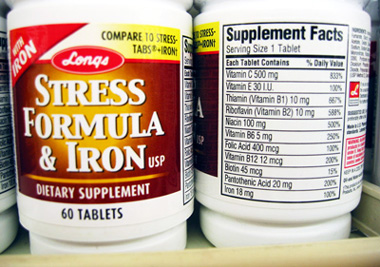Dietary Supplements:
Do They Lower—or Raise— the Risk of Cancer?
by Suzanne P. Murphy, Ph.D., R.D., Researcher, Cancer Research Center of Hawaii, Honolulu

More than half of the U.S. adult population takes some type of dietary supplement. In fact, in 2005, this growing constituency spent about $23 billion on such products.
Choosing a supplement today is no small task. Most supplements contain one or more essential vitamins and minerals. Some contain compounds found in foods that are not considered nutrients, such as isoflavonoids (from soy products), while others contain herbal and botanical compounds not normally found in foods (such as saw palmetto or ginseng). Increasingly, dietary supplements contain combinations of many different compounds. Furthermore, the line between a food and a dietary supplement has become blurred, because compounds found primarily only in dietary supplements are now being added to foods (e.g., ginseng in beverages), while foods can appear on the market as pills or capsules (e.g., dried cranberry powder). Some dietary supplements provide nutrients at approximately the recommended daily level (following guidelines such as the Recommended Dietary Allowance (RDA) or Daily Values), while other supplements provide much higher levels, often beyond those obtainable from food alone. In many countries, bottle labels provide information on the percent of the recommended nutrient intake that is supplied by a dose of the supplement (see image).
Do Supplements Protect Against Cancer?
Dietary supplements might protect against cancer by providing essential nutrients that are low in a typical diet. (Nutrient intakes that are below requirements eventually lead to deficiency diseases, and are also likely to be associated with a higher risk of chronic diseases such as cancer.) For example, a 1986-1991 study in a poorly nourished population in China found that both new cases of cancer, as well as deaths from cancer, were reduced in those who received supplements containing the antioxidants vitamin E, beta-carotene and selenium at one to two times the daily recommended level. Thus, individuals with diets that are low in antioxidants might benefit from dietary supplements that provide these nutrients.
Many dietary supplements deliver levels of nutrients that greatly exceed the RDAs, often at levels not possible to achieve with food alone. Many studies in different parts of the world have addressed the question of whether high levels of supplements can reduce cancer risk in relatively well-nourished populations. Observational studies that have looked at cancer risk among people who chose to use dietary supplements have sometimes found significant associations, but many of these associations have not been supported by placebo-controlled randomized trials. The observational studies may be misleading because, as is well-known, people who choose to use supplements generally have healthier behaviors (such as better diets and lower body weights) than those who do not use supplements, and these confounding factors may contribute to their lower risk of cancer.
Results from randomized trials to date do not provide conclusive evidence about the efficacy of dietary supplements. From 1985-1993, one of the few trials showing a positive effect of supplements found a decreased risk of prostate cancer (and, possibly, of colon cancer) among male smokers who were given 50 mg of vitamin E per day (about three times the RDA). However, several other high-dose vitamin E trials did not demonstrate a reduction in cancer risk, or in total mortality. Three studies have demonstrated a protective effect of selenium supplements for certain cancers, but the studies have several flaws and the results are inconclusive. In a 1994-2002 study in France, a combination of several antioxidants (vitamin C, vitamin E, beta-carotene, selenium and zinc) at about twice the RDAs reduced the overall risk of cancer in men, but not in women. An ongoing trial in the United States, Puerto Rico and Canada of the effect of selenium and vitamin E supplementation on prostate cancer may allow stronger conclusions about supplements of these two nutrients, at least for this particular cancer site.
Do Supplements Increase Cancer Risk?
Most nutrients have the potential to cause toxicity if taken at high enough levels, which raises concerns about the amounts of nutrients that can easily be obtained from dietary supplements. Several randomized studies seem to point to possible risks of taking high levels of dietary supplements, including an increased risk of cancer. Perhaps best-known is a study of beta-carotene and lung cancer among smokers, conducted from 1985-1993 in Finland. In an unexpected finding, smokers who received beta-carotene had a higher risk of lung cancer. The same phenomenon occurred in a similar 1989-1996 study of smokers and asbestos workers in the United States. Other studies involving non-smokers have found no effect of beta-carotene on cancer risk. In the above-mentioned antioxidant study in France, the risk of prostate cancer was reduced in men with a normal baseline prostate-specific antigen (PSA) but increased in those with an elevated baseline PSA. These studies have increased awareness of possible adverse effects of dietary supplements, at least for some segments of the population.
The Bottom Line
In spite of the wide popularity of dietary supplements, there have been few well-designed studies to date that document their effectiveness in reducing the risk of cancer. Furthermore, there is concern about possible adverse effects, particularly at intake levels that exceed the RDAs. More systematic studies of the risks and benefits are clearly needed.
In May 2006, a panel convened by the National Institutes of Health in the United States concluded, “The present evidence is insufficient to recommend either for or against the use of multivitamin/mineral supplements by the American public to prevent chronic disease.”